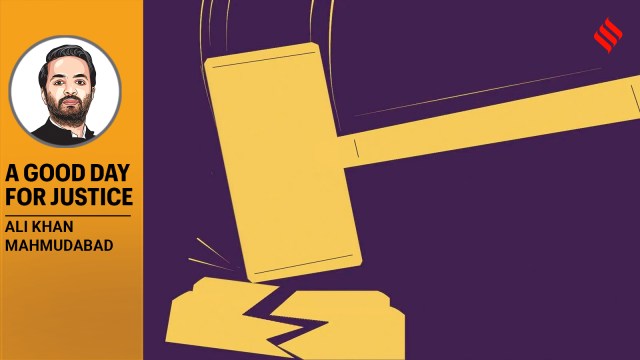
The Waqf (Amendment) Act, 2025, which has cruelly retitled the original act of 1995 with the acronym UWMEED or hope, has polarised opinion. Much of the debate has revolved around issues of religious reform, corruption, land-grabbing — labelled “land jihad” by some — perceived historical wrongs and more equitable caste and gender representation on various waqf bodies. However, issues concerning fundamental rights, including the right of religious minorities to establish and run their own institutions, have been elided over. Consequently, several people have questioned the constitutional validity of the Act and a series of writ petitions have been filed in the Supreme Court.
On the first day of the hearing, the courtroom was abuzz. The petitioners were represented by Kapil Sibal, Abhishek Singhvi, Sanjay Hegde, C U Singh, M R Shamshad and Nizam Pasha, amongst others. Singhvi pointed out that nearly half of all waqfs are waqf-by-user but now the government has given itself the power to take them over without due process. For example, many historic mosques, shrines, graveyards and other public institutions are often deemed waqf-by-user. Sibal and others highlighted the absurdity of denotifying a centuries-old waqf overnight for lack of documentation. For example, a national monument like the Jama Masjid in Delhi or a shrine in a small rural qasba could be declared government property simply because there are no documents for waqfs created centuries ago.
According to the Act, any land disputed by the government would cease to be waqf land during the pendency of the enquiry. This is especially alarming given the delays in litigation in India. Following these and other arguments, the judges indicated that they would pass interim orders the next day on three issues: No property declared to be waqf by courts, whether waqf-by-user or waqf by deed, would be denotified during the pendency of the case; the proviso that says a waqf property will not be treated as waqf while the collector is determining its status would not come into effect; and all members of the Central Waqf Council and state Waqf Boards must be Muslim, except ex-officio members.
The promise of interim relief was important because various BJP-ruled states had not only begun to take action under the amended Act but even prevented people from protesting against its provisions. Less than a day before the hearing, the UP government denotified 58 acres of waqf land in Kaushambi and reports were coming in from all over the state that local police had been ordered to gather documents from local mosques, shrines and other religious institutions.
On the second day of the hearing, Solicitor General of India (SG) Tushar Mehta claimed that the rule of thumb was that courts would not directly or indirectly stay legislation. The judges responded that the other rule of thumb was that “the situation which is prevailing should not change so that the rights of persons are not affected”. In effect, the judges decided that extraordinary times called for extraordinary measures. They took on record the SG’s statements that in the interim, non-Muslims would not be appointed to the Central Waqf Council or the state Waqf Boards under the terms of the amended provisions and also that waqfs, including waqf-by-user, would not be denotified nor would their character or status change.
The interim relief is crucial because it protects citizens from the extraordinary power the government has granted itself through the Act. In a country with no penalty for frivolous, let alone pernicious, litigation, staying the collector’s powers to denotify a waqf is an important way to stop the Act from being deployed as a political weapon. The interim order will also go a long way in giving reassurance, albeit symbolically, that courts are taking cognisance of how the government is arrogating to itself the rights of judge, jury and executioner.
In recent years, the bulldozer has become the preeminent symbol of this phenomenon, whereby the government has circumvented judicial due process and demolished institutional checks and balances. Ghazala Jamil’s identification of the amended Waqf Act as “a legal bulldozer for minority rights” captures how the government seeks to cloak its political will in the garb of legality.
This weaponisation of the law is precisely what the separation of powers is meant to prevent. However, it is not enough to enshrine this in law; it’s also necessary to be seen to be upholding the separation and protecting institutions from encroachment by the other arms of the government. For this, justice must not only be done but be seen to be done while also remembering that what is legal is not necessarily just. A small exchange in court illustrates this. The SG stated that if the judges accepted the objection to the presence of non-Muslims on the statutory board(s), the bench would also not be able to hear the matter. The judges asked the SG whether Muslims would therefore be given space on the boards of Hindu endowments or religious institutions. He replied, “… your Lordships cannot hear this matter if we go by that logic”. In essence, the SG reduced the judges to their ostensible religious identity. The judges had to remind him that when on the bench, “we lose our religion, we are absolutely secular”. The articulation of this obvious yet crucial aspect of their constitutional position goes a long way in restoring some confidence in the impartiality of the judiciary.
Although the case might become drawn out, the interim order should protect the rights of individuals and prevent the government from misusing the law. How courts will enforce this interim relief and indeed their judgments remains to be seen as various governments continue to brazenly ignore court orders. At the very least, the interim order keeps the hope of justice alive at a time when merely voicing dissent is dangerous.
The writer is head of the Department of Political Science at Ashoka University